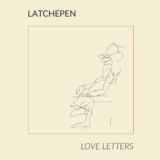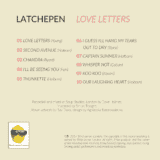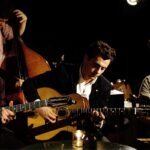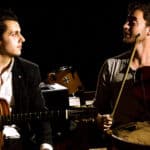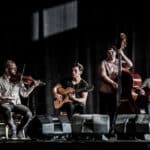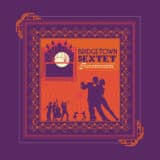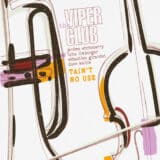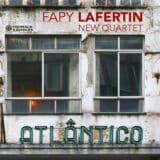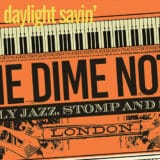Latchepen
Upbeat swing to jazz, unfamiliar Gypsy Jazz fare and cool original compositions
London-based chamber-style Gypsy Jazz Manouche band with four brilliant musicians with a passion for Django Reinhardt, 1930’s swing and Romani music in general. Their music is a contemporary reflection on the era that saw jazz hit heights in popularity never to be seen since.
Violinist, composer Matt Holborn leads the quartet guitarists Kourash Kanani and Dave Kelbie plus bassist Simon Read.
Gypsy jazz is a musical dialect unique to Europe. With its French origins, it tends to be very melodic, extremely flamboyant and full of romanticism and nostalgia. Latchepen brings its upbeat swing to jazz, bebop and songbook standards, unfamiliar Gypsy Jazz fare and high-quality original compositions, the latter influenced by Romani folk, Balkan, Mediterranean and North African music. It offers something fresh and exciting while working broadly within the Gypsy Jazz template. Intriguing and invigorating in equal measure, the quartet intertwine playful guitars, sparkling violin and melodic bass, the rapid chug of the rhythms fuelling nimble solos from all four members of the group. This is virtuosic, wildly exciting stuff.
The group name comes from an exclamation expressing ‘happiness and contentment’ in the Romani language.
MATT HOLBORN – Violin
KOUROSH KANANI – Guitar
DAVE KELBIE – Guitar
SIMON READ – Double Bass
LATCHEPEN TRACKLISTS & RECORDINGS
PRESS
ALL ABOUT JAZZ US
THE JAZZMANN UK
LONDON JAZZ NEWS UK
No Events
https://www.mattholborn.com
BACK TO THE RECORDS
LATCHEPEN REVIEWS
ALBUM REVIEW. THE JAZZMANN UK 15.12.2017
Love Letters by Latchepen
Latchepen is a new London based quartet playing music inspired by Django Reinhardt and by Romani music in general. The group name comes from an exclamation expressing “happiness and contentment” in the Romani language.
I’m grateful to the group’s violinist, Yorkshire born, Scottish raised Matt Holborn, for forwarding me a review copy of this CD. I was previously familiar with Holborn’s playing after seeing performing as a guest with guitarist Remi Harris, the latter a regular presence on the Jazzmann web pages and something of a local hero as far as I’m concerned.
The Latchepen line up is completed by guitarists Kourash Kanani and Jeremie Coullon plus bassist Simon Read. Read is the second member of the group that I have seen performing live. He recently appeared at the Vortex in Dalston during the 2017 EFG London Jazz Festival as part of a trio led by pianist and composer Sam Leak. In this very different context Read was allotted a good deal of solo space and I was highly impressed by the fluency and dexterity of his playing.
Although inspired by Reinhardt the ten tracks on Love Letters don’t actually mine this rich, but by now overly familiar seam. Instead the programme embraces five original compositions, four of them written by Holborn, plus a handful of jazz and bebop standards, but not the usual gypsy jazz staples.
The album commences with the title track, a 1945 tune written by Victor Young with lyrics by Edward Heyman. It begins in surprisingly subdued fashion with the two guitars intertwining before springing into more familiar gypsy jazz territory with the rapid chug of the rhythms fuelling solos from Holborn and Kanani.
Second Avenue, written by Holborn is the first of the originals. The playful, stop-start motif hints at exotic locations and although the tune accelerates its progress is still quirky and jerky. There’s a pleasing sense of unpredictability about a piece that harbours further fluent solos from Holborn and Kanani.
Chandra, a blues written by the pianist Jaki Byard, is unfamiliar gypsy jazz fare but the quartet impose their own stamp on it. Also drawing on bebop influences the piece includes nimble solos from Read, Coullon, cutting loose for the first time, and Holborn. There’s a later set of exchanges between Holborn and Kahani before the guitarist takes over to wrap up a piece that features all four members of the group as soloists.
It’s back to the ‘Great American Songbook’ for the quartet’s take on I’ll Be seeing You, written by Sammy Fain with lyrics by Irving Kahal. The gypsy jazz arrangement evokes memories of Reinhardt, Stephane Grappelli and the Hot Club of France with Holborn playing the theme before handing over to the two guitarists who trade elegant solos, Kanani going first followed by Coullon.
The Holborn original Thunkette introduces elements of klezmer and North African music as it blends gypsy jazz with other musical styles. There’s an almost oud like quality about Kanani’s guitar solo with Holborn’s violin feature sounding similarly exotic. Intriguing and invigorating in equal measure this is one of the album’s stand out tracks.
The quartet display a gentler side of their collective musical personality with their sensitive ballad interpretation of the standard I Guess I’ll Hang My Tears Out To Dry written by Jule Styne with lyrics by Sammy Cahn. Kanani sketches the melody while Holborn and Coullon supply the thoughtful and lyrical solos.
Holborn’s Captain Summer combines something of the quirkiness of his earlier compositions with more familiar Hot Club stylings to beguiling effect. The composer takes the first solo on violin followed by Coullon on guitar and finally Read at the bass.
Whisper Not, written by saxophonist Benny Golson, represents a dip into the classic jazz repertoire with an effective gypsy jazz interpretation that sounds perfectly natural and includes sparkling solos from Kanani and Holborn plus a pleasingly melodic excursion on the bass from Read.
Kanani takes over the compositional reins for Koo Koo which finds the guitarist doubling up with Holborn on the fast moving, boppish melody line as Coullon and Read pump out an energising rhythm. This in turn helps to fuel mercurial solos from Kanani and Holborn. This is virtuosic, wildly exciting stuff.
The album concludes on a gentler note with the Holborn composition Our Laughing Heart, a short ensemble piece with the plaintive, emotive sound of the composer’s violin in the foreground.
It’s a highly effective way to end a very good album.
There’s a lot of gypsy jazz around and in the last few years I’ve got to hear a lot of it. It has to be said that it can become rather clichéd with its many practitioners drawing on the same well of Django Reinhardt and related material.
Not so Latchepen, which is why their approach is so fresh and invigorating. Although obviously inspired by Django, Stephane et al there isn’t actually a Reinhardt tune on this album, and in my opinion it’s all the better for it. The playing is excellent throughout with a well balanced ensemble sound and some superb solos but the most refreshing thing is the quality of the original material. The writing of Holborn and Kahani is playful and inventive and offers something fresh and exciting while working broadly within the gypsy jazz template.
In addition the group’s interpretations of jazz, bebop and songbook material are also pleasingly cliché free with the quartet offering fresh insights into their well chosen material.
Love Letters is one of the most satisfying albums of its type that I’ve heard for quite a while.
IAN MANN
ALBUM REVIEW. LONDON JAZZ NEWS UK 01.11.2017
Love Letters by Latchepen
It is impossible to ignore that many of the young British jazz musicians releasing albums at the moment are conservatoire educated. Due to the nature of their education, these musicians tend to explore new sounds, new harmony and new ways of playing. This is certainly no bad thing. Sadly, there is not always a place for playing more traditional forms of jazz and playing them to an exceptionally high standard.
Latchepen is an ensemble doing just that whilst bringing originality to the genre with original compositions.
The album begins with classically inspired guitar counterpoint before erupting into a high energy take on Victor Young’s Love Letters.
Violinist Matt Holborn displays his ability to move around the instrument fluidly whilst speaking fluently in the jazz manouche language. The guitarists, Kourosh Kanani and Jeremie Coullon exhibit a similar level of agility and make great use of melodic development, taking phrases and moving them around the neck of the instrument. The violin and guitar engage in high octane trading which bursts forth with joyous energy.
Second Avenue is the first of many Holborn originals. The theme is based around a playful motif which pauses mysteriously, like a steam train waiting in the darkness. The hits from the rhythm section allow the solos to build before the ensemble move in to a lively swing rhythm. Thunkette is an original with a distinct klezmer influence. The harmonic movement of the the piece is static, allowing the guitar to fully release the brakes on the solo section. This opens up a universe of carefully constructed patterns and melodic manoeuvring. Captain Summer is written in a traditional gypsy jazz style. In fact, if you weren’t to check the album notes, you could well be fooled into believing it is a jazz manouche standard.
The quartet take a step in the bebop direction with the Jaki Byard blues Chandra. The unison melody makes way for double bassist Simon Read to take a solo which is full of bop language. The solo is melodic, well paced and complemented with tasteful blues inflections. It is interesting to note the contrasting solo language used by the guitar, violin and bass, the bass being more in line with the bebop style, the guitar using diminished scale runs which are such a big part of gypsy jazz, and the violin opting for a gliding melodicism.
I’ll Be Seeing You is a take on a traditional standard. Brimming with nostalgia, the violin has a dark tone and the harmonics of the instrument are audible if you listen intently. The production of the album contributes to the vintage sound of the track. The recording is very appropriate for the ensemble. It sounds as though they were all sitting and playing in the same room, a quality lacking in some modern recordings. Benny Golson’s much loved composition Whisper Not gets the gypsy jazz treatment with the melody split between the guitar and violin. I Guess I’ll Hang My Tears Out to Dry is a pretty ballad and in many ways a change of dynamic on the album.
The guitar takes the lead on the performance and is supported in a sympathetic manner from the rhythm guitar and bass. The rhythm section create a solid, yet delicate foundation which never falters but absorbs every note emanating from the lead instruments. After displaying his virtuosity as a guitarist, Kourosh Kanani demonstrates his compositional ability on the bright swing piece Koo Koo. The impressively executed unison melody line has a flavour of bebop standard Anthropology although it is certainly original and inventive.
The album is brought to a peaceful close with the short, through composed original Our Laughing Heart. Jazz as a musical form has never stood still for very long and development is part of its DNA. However, bands like Latchepen help to celebrate the past achievements of the music without wallowing in pure nostalgia. The compositions are intelligent, the standards are well executed and the performances are flawless.
JOHN MARLEY
ALBUM REVIEW. ALL ABOUT JAZZ US 17.12.2017
Love Letters by Latchepen
Meet Latchepen—London-based gipsy jazz band consisting of four brilliant musicians (three of them being conservatory graduates). Full of passion for Django Reinhardt and 30s swing, their debut album Love Letters translates into a contemporary reflection of the era that saw jazz hit heights in popularity never to be seen afterwards, even though the particular type of jazz articulated by Latchepen never came to be a mainstream attraction during the time.
Gipsy jazz has always seemed an extremely exotic variable in jazz history, since its origins lie outside the United States, i.e. France. Because of its French origins, gipsy jazz tends to be very melodic, extremely flamboyant, and harmonically saturated. It can also sound extremely romantic when performed in a chamber-type setting. This, of course, is an oversimplification of this peculiar niche sub-genre in jazz history. Yet, judgment values should be established, even though most of them (if not all) are very arbitrary, especially when addressing jazz.
The amount of flamboyance exhibited on Latchepen proves is crucial to the encapsulation of an authentic mood found in gipsy jazz. The rest, however, is a mixed-bag that falls into the typical debut album syndrome in jazz, where a band tries to show its versatility by sacrificing the content’s coherence or its conceptual unity.
The album features both jazz standards and original compositions that are too far apart. It’s not that one of the disparate parts is better than the other. Both are full of romanticism and nostalgia, although some of the band’s original compositions sound even more exotic than most gipsy jazz, evoking the mood of Balkan and Mediterranean regions, which are both geographically and culturally situated further away from the gipsy jazz country of origins—France. It’s not that one (standards or originals) sounds less gipsy than the other. Holborn’s violin intonation is remincent of a self-taught travelling musician rather than a conservatory graduate, which significantly enhances the atmosphere for the better in terms of the sub-genre’s authenticity. Yet, it doesn’t seem to be coherent both conceptually and in terms of overall musical dynamics.
As a result, it is difficult to evaluate Love Letters as an organic unit, which an album should be. It doesn’t, however, diminish the potential Latchepen retains throughout their debut release. If only one direction (either original compositions or standards from The Great American Songbook) was chosen, it might have worked better, and carried more excitement. The foundation is there; hopefully a second album by the band will carry a more linear approach.
ROKAS KUCINSKAS

